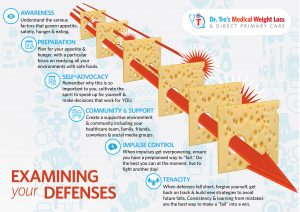Holidays, vacations and social situations present challenges no matter what phase of the low-carb journey we may be in and are a big reason many abandon their diets. This can create huge problems that are difficult to recover from and set us back for months. One of the greatest tools we use in our approach to weight loss is the Swiss Cheese Model of Defense, which provides a great framework with which to approach special events so that we stay on track and don’t end up undoing all of our hard work.
 Awareness
Awareness
It is hugely important to understand the factors that make holidays and special occasions difficult: we are surrounded by family, friends, and loved ones, and even though we may be having a great time, it can be a trap! Typically, we are put in a situation where every food we had difficulty restricting in the past is now staring us in the face. So, not only are we confronted by traditional family favorites and comfort foods like “Grandma’s Famous Cherry Pie” or Mom’s extra-special carrot cake calling our name for hours on end, but we may also have to deal with peer pressure from family and friends trying to guilt us into eating something terrible to make themselves feel comfortable at parties and get-togethers.
Another thing that can derail us during these times is stress. Holidays and social situations can be very demanding with travel, sometimes not knowing what we will face when we arrive at our destination and dealing with trigger foods all around us. We all know stress alone is enough to drive us to eat, and during holidays and vacations, we often have more time off from work, so there is more downtime which can lead to grazing and eating out of boredom. Also, some of the places and people we visit during holidays can be comforting, but they can also be stressful places from our childhood that can cause us to let our guard down.
Combine peer pressure, comfort, stress, boredom, and all your problem foods of the past in one place, and it’s a near perfect storm for eating off plan.
Now that we are aware of what we are up against, what’s next?
Preparation
During holiday celebrations, we usually know when and where we’re going. Traditionally, most celebratory dinners include low-carb friendly options like turkey, ham, pork, rib roast, vegetables, cheese, and deviled eggs. To be sure, don’t be shy – ask the host ahead of time a few questions like “What is everyone bringing food-wise?” or “Can I bring anything?” This way, you know what low-carb friendly foods will be available in advance, and can bring something to complement it.
Another option is to offer to host the event at your home or suggest a meeting spot for the social gathering. This guarantees you have a safe food environment, and are in total control.
Social situations can sometimes catch us by surprise, which is a massive disadvantage for preparation. One tactic, particularly helpful for parties and one-time events, is to eat before you go. This may be counterintuitive, but if you fill up before you go, you will fare much better in the situation than trying to white-knuckle your way through limited safe food options.
Lastly, for preparation, two recommended key points:
Make a low-carb dessert recipe or have a quick pre-packed low-carb product handy (in the car, your purse, etc.). Unfortunately, most holiday gatherings or social celebration usually have many triggering sweets. Sometimes even after eating all the protein and fat you can handle, the sight and smell of a dessert will still tempt you. Having a safe option of your own can keep that from happening. Often when we’ve brought a low-carb dessert, other guests enjoy it, ask for the recipe, and it can be a good conversation starter about your “crazy” keto diet.
And lastly, steer clear of alcohol. For many, it drives us to eat more and can lower defenses – not a good thing when we are already under stress, in a dangerous food environment, and possibly facing peer pressure.
Self-Advocacy
During these situations, the people we love the most can be the worst for trying to sabotage our efforts, and it will be necessary to draw upon self-advocacy to get through.
If you are able to do so, try being honest and upfront before the holidays and let family and friends know that you have changed to a healthier lifestyle, and you no longer eat certain things. You might be surprised how supportive some are, even going out of their way to make you something special.
That is the best-case scenario, but it is not always the norm. You may hear all kinds of rude things from people you love and respect:
“You’re getting too skinny, have some cake!”
“Have you been sick?”
“You have been so good – one piece won’t hurt!”
“Are you ever going to eat real food again?”
Stay strong and remember your why’s: why you have decided to make this dietary and lifestyle change, why this is so important to you. Reflect on all the hard work you have done and how far you have come and ask yourself if it’s worth undoing or suffering a setback just to appease others.
You decided to put yourself first, and the people trying to push you don’t have to deal with the negative consequences or the health issues of eating high carb foods that don’t work with your new lifestyle. A lot of people do this because they don’t like changes in others, and it makes them uncomfortable, or they are insecure with themselves. Putting yourself first in this situation isn’t selfish, it’s necessary.
Hopefully, you have a great support system and don’t have to deal with this type of thing, but if you do, it will be necessary to find your voice and self-advocate. There are many polite things you can say like:
“I had to do this to avoid medication”
“My doctor recommended I eat this way to get healthier”
“I needed to make a change in the foods I was eating”
“I don’t feel well when I eat these foods”
…or anything it takes to get people off your back!
Community & Support
When beginning a low-carb lifestyle, it’s essential to create a community support system consisting of family members, friends, coworkers, healthcare teams, and social media groups – a group of people you can turn to when things get tough is an excellent defense to have in place in any situation, especially during emergencies.
A supportive or encouraging text, phone call, or message is sometimes all you need to avoid a bad situation. Having people at your fingertips that can be contacted quickly to offer some fast advice or help motivate you to make good decisions can be enormously helpful. Another tip is to seek out other attendees at a party who are also working on eating healthier so you can lean on each other for support during the gathering — even if they are eating a different diet than you are, just having someone who understands what you’re going through can be just what you need to get you through a difficult situation.
Lastly, have an exit strategy planned if things get too out of hand by having an excuse ready in case you need to escape the situation. Use this as a last resort, but it might be the best option if you are still not comfortable with self-advocacy or generally like to avoid confrontation.
Have some people in your support system on standby and let them know you are heading into a potentially challenging situation, so you know you have someone ready to answer that call or text if you need them.
Impulse Control
Impulse control, or willpower is tightly linked to Preparation and Community and Support and means doing the best you can in the situation you are in.
Impulse control is not always reliable and comes in limited supply, which is why I suggest you bring a dish or dessert or get some information about the position you’ll be in ahead of time so that you can rely on all the other defenses before this one. Impulse control alone is usually not enough when you’re facing stress, peer pressure, and a room full of trigger foods.
Willpower has a meager success rate in these situations, so always have a low-carb out. So, what exactly do we mean when we say a low-carb out? First, you must understand humans are the only animals on earth expected not to eat when food is put in front of them. If you fill up a dog’s bowl, they will eat until the food is gone. Fill it up as soon as they’re done, and they will eat again. This pattern will repeat until they get sick. Humans are not wired very much differently, and when all this food is in front of us the entire day, we rely on the following strategy: “Binge low carb, and live to fight another day.”
What does that mean? If you find your cravings are out of control, don’t limit the number of low-carb options you eat. Eat all the beef, turkey, ham, low-carb fruits and vegetables, deviled eggs, cheese, cold cuts, and low-carb desserts until your brain and the cravings shut off. Is this going to be a weight-loss strategy? In the immediate moment, no. But you will win on the back end by not spiking your blood glucose and losing those appetite and cravings-suppressing ketone levels you have been working so hard to build up. Also, you won’t have to deal with the aftermath of water gain, which can be discouraging to see on the scale, you won’t feel the physical effects of higher carbs like gastric issues and bloating, and when things calm down it will be a much easier transition back to your regular low-carb eating.
Going off track can be dangerous – we have seen some people slip on a bit of Halloween candy and continue to slide, and before they can get themselves back on track, Thanksgiving and Christmas roll around, and by then, they tell themselves, “May as well wait until after the New Year’s.” By that time they have completely undone all their hard work and are facing a big weight gain and have lost the appetite-suppressing effects of ketones. Birthdays, vacations, anniversaries, and other celebrations do the same thing. By sticking low carb you avoid the slippery slope that high carb foods have always been.
Tenacity
Sometimes despite our best efforts, these defenses fall short – this happens to all of us at some point in our journey, but it doesn’t have to be considered a failure.
When we fall, we need to forgive ourselves and get back on track as soon as possible. Getting back on track can be as soon as our next meal. Just because we fall doesn’t mean we should abandon the entire day, week, month, or beyond. You didn’t get to where you are by eating one low-carb meal, so you won’t undo all your success by making one wrong choice.
Turn this fall into a win by first re-examining your defenses and figure out how the current situation made its way through each one. Then ask yourself:
“Where was I when this happened?”
“When did this happen?”
“Why did this happen?”
“What kinds of foods did I crave and go for?”
Once you have the answers to these questions, you can quickly figure out which defenses need improvement for next time. Maybe you will find out it was a particular food that set you off, and can prepare a low-carb replacement for next time. Maybe you figured out you didn’t eat enough that day, and when your hunger kicked in, you were unprepared. Perhaps it was a place where there were no options, and you didn’t give yourself a safe out. Perhaps a quick text from a supportive friend might have helped remind you to stay on track.
Use all this information to bolster these defenses and make sure they are stronger the next time you’re faced with a similar situation. This is a learning process, and sometimes it is necessary to fall many times before our defenses are strong enough.
Learning from a mistake and using it to prepare against future errors is a superpower, and a way to make every challenge a win.
Methodically start to apply these defenses to your life, especially any upcoming vacations, social engagements, and holidays. Re-think previous times you may have stumbled, focus on which defenses might have helped in a previous scenario and then build each one up until you have a foolproof system in place.






